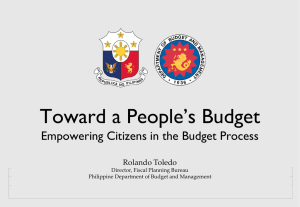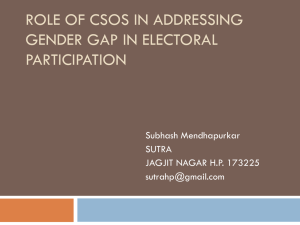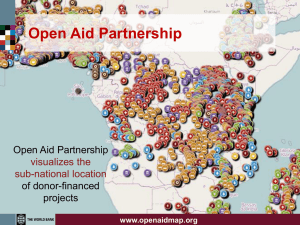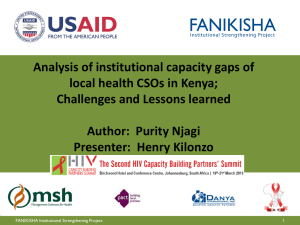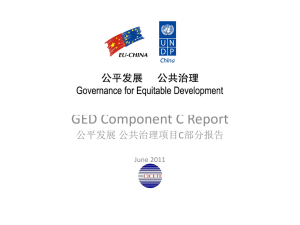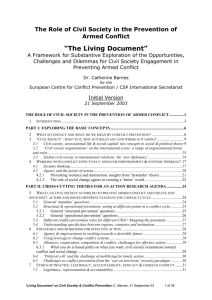Elaboration of a Code of Ethics for CSOs In Cameroon
advertisement
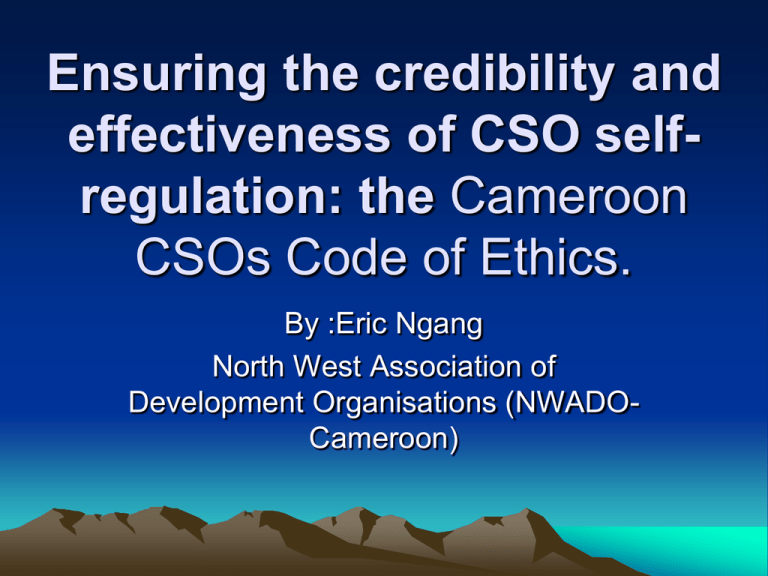
Ensuring the credibility and effectiveness of CSO selfregulation: the Cameroon CSOs Code of Ethics. By :Eric Ngang North West Association of Development Organisations (NWADOCameroon) What is the code of Ethics for CSOs • It is a document that defines a set of norms, principles and values to standardise the conduct, action and behaviour of CSOs and recognises CSOs as a voluntary, non profit, nonself-serving, with legal existence, nongovernmental, non-partisan and independent organization or association involved in the promotion of social justice and development. CSOs can have a national or international mission. Drivers • The Code is intended to improve partnerships between public sector, other CSOs and the Private Sector including overseas development partners and CSOs by defining accepted and acceptable behaviour, promoting high standards of practice and providing a benchmark for CSOs to use for self-evaluation. Background • Civil Society Organizations in Cameroon have, over the years played an increasingly influential role in promoting social and economic change. • They have influenced in no small measure, local and national policy-formulation and in certain instances, have taken over roles and duties that traditionally belonged to the government. In addition, due to their watchdog status, CSOs have become key players in the democracy movement, demanding high standards of transparency and accountability from government. Background cont • It is therefore not surprising that the increase in influence of CSOs in recent years has also raised the issue of transparency, legitimacy, accountability and general good management practices on the part of CSOs themselves Background cont • Within this context, the Government and several overseas development partners have commonly raised the concerns about the proliferation of CSOs, the credibility, acceptability and accountability of some CSOs. • It is therefore imperative for the CSOs to set clear standards of accountability, credibility and transparency. What CSOs aim to achieve with a Code of Ethics? • Improve their credibility and acceptability vis-à-vis the government, the population, financial and technical partners in and out of the country. Target groups and beneficiaries Direct target groups will be voluntary, notfor-profit, non-self-serving, nongovernmental, non-partisan and independent organizations or association involved in the promotion of social justice and development recognized under the laws that regulates CSOs (Associations, Cooperatives and Common Initiative Groups and NGOs) in Cameroon. The Organizations may be secular or "faith-based" Target groups and beneficiaries Cont • Indirect target groups shall include the communities that these organizations serve and work with, the Government that supports and regulates the work of these organizations and overseas development partners that provide them with various forms of assistance. The process •Working sessions were organized with a core working team of 12 key organisations (NOWECA, NWADO, SIRDEP, RIDEV, FONDATION FIDEPE/OIASC, COMINSUD, Club Media Ouest, GEED Foundation, AJPCEDES, Light Africa. INADES Formation, NOWEFOR ). •A questionnaire for CSO image was developed and administered. Sample codes of ethics from other countries and organisations were consulted as base documents and a draft code of ethics was produced which was discussed and agreed upon . Process continues • A National civil society reflection was held in 2009 bringing together 50 CSOs from across the national territory during which the draft code of ethics was further enrich with country experience especially the process carried out by DENIVA, in Uganda. • A press conference was organised during which the code of ethics was presented to the public. Content of the code of ethics • • • • • • • • • • -Definition -Scope -Principles and Aspiration -Good Governance -Organizational integrity and independence -Management and Human Resources Financial Management and accountability -Communication and networking - Conflict of Interest -Enforcement of the Code -Revision of the Code Way Forward • -Reflection on setting up an Ethics Committee and how it will function • -Procedures for accreditation and a format for demand for accreditation • -Formulate procedures for complains and redress at the Ethic Committee. • - Reflection has to be done on revision of the Code, indicators and challenges. • -Widely disseminate the Code Challenges • Civil society in Cameroon is very diverse and it is difficult to achieve sector wide and country wide support from potential stakeholders. • Some CSOs simply view the code as another layer of regulation and fear sanctions and so resist adherence. • NWADO also find it difficult to acquire adequate financial resources to disseminate and implement the code at all levels in Cameroon (i.e. both local and national NGOs). Thanks for your attention



